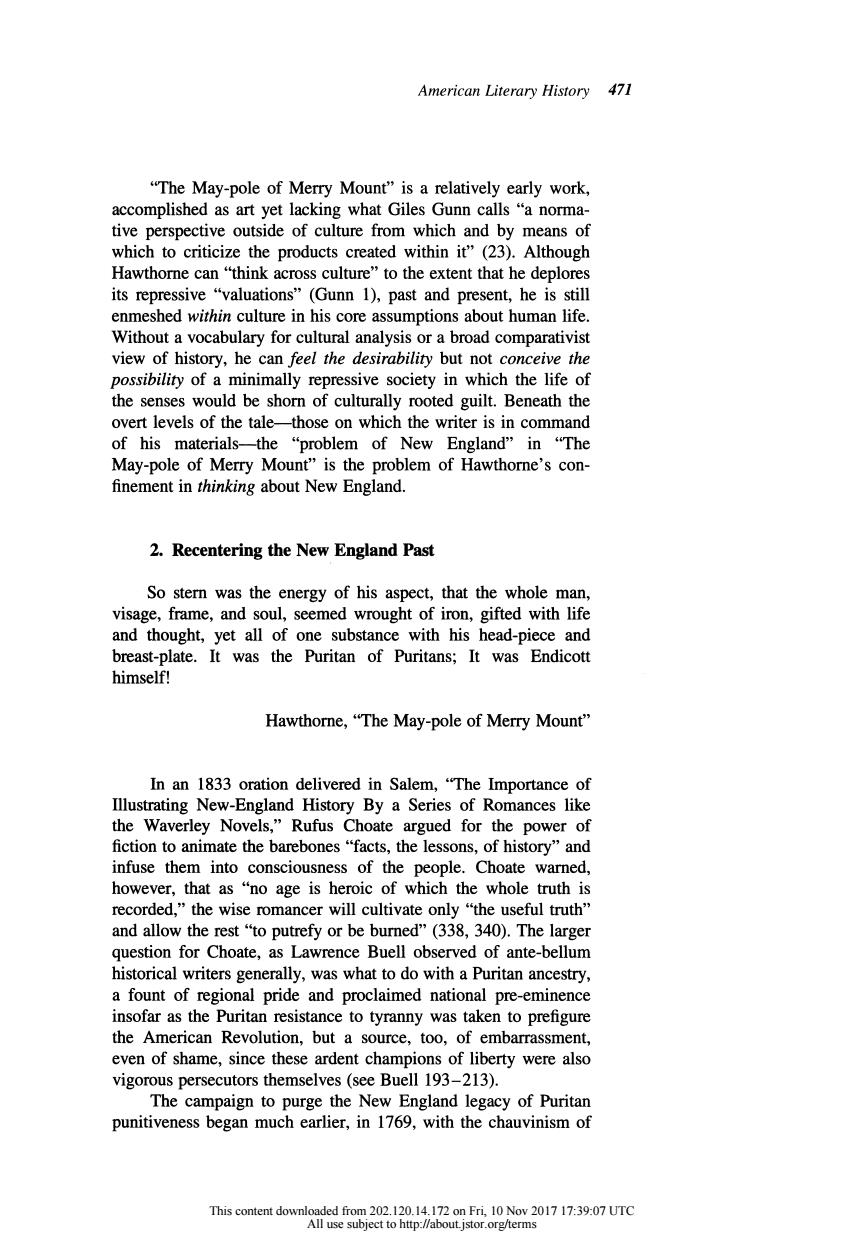正在加载图片...

American Literary History 471 "The May-pole of Merry Mount"is a relatively early work, accomplished as art yet lacking what Giles Gunn calls"a norma- tive perspective outside of culture from which and by means of which to criticize the products created within it"(23).Although Hawthorne can "think across culture"to the extent that he deplores its repressive "valuations"(Gunn 1),past and present,he is still enmeshed within culture in his core assumptions about human life. Without a vocabulary for cultural analysis or a broad comparativist view of history,he can feel the desirability but not conceive the possibility of a minimally repressive society in which the life of the senses would be shorn of culturally rooted guilt.Beneath the overt levels of the tale-those on which the writer is in command of his materials-the "problem of New England"in "The May-pole of Merry Mount"is the problem of Hawthorne's con- finement in thinking about New England. 2.Recentering the New England Past So stern was the energy of his aspect,that the whole man, visage,frame,and soul,seemed wrought of iron,gifted with life and thought,yet all of one substance with his head-piece and breast-plate.It was the Puritan of Puritans;It was Endicott himself! Hawthorne,"The May-pole of Merry Mount" In an 1833 oration delivered in Salem,"The Importance of Illustrating New-England History By a Series of Romances like the Waverley Novels,"Rufus Choate argued for the power of fiction to animate the barebones "facts,the lessons,of history"and infuse them into consciousness of the people.Choate warned, however,that as "no age is heroic of which the whole truth is recorded,"the wise romancer will cultivate only "the useful truth" and allow the rest "to putrefy or be burned"(338,340).The larger question for Choate,as Lawrence Buell observed of ante-bellum historical writers generally,was what to do with a Puritan ancestry, a fount of regional pride and proclaimed national pre-eminence insofar as the Puritan resistance to tyranny was taken to prefigure the American Revolution,but a source,too,of embarrassment, even of shame,since these ardent champions of liberty were also vigorous persecutors themselves (see Buell 193-213). The campaign to purge the New England legacy of Puritan punitiveness began much earlier,in 1769,with the chauvinism of This content downloaded from 202.120.14.172 on Fri,10 Nov 2017 17:39:07 UTC All use subject to http://about.jstor.org/termsAmerican Literary History "The May-pole of Merry Mount" is a relatively early work, accomplished as art yet lacking what Giles Gunn calls "a norma tive perspective outside of culture from which and by means of which to criticize the products created within it" (23). Although Hawthorne can "think across culture" to the extent that he deplores its repressive "valuations" (Gunn 1), past and present, he is still enmeshed within culture in his core assumptions about human life. Without a vocabulary for cultural analysis or a broad comparativist view of history, he can feel the desirability but not conceive the possibility of a minimally repressive society in which the life of the senses would be shorn of culturally rooted guilt. Beneath the overt levels of the tale?those on which the writer is in command of his materials?the "problem of New England" in "The May-pole of Merry Mount" is the problem of Hawthorne's con finement in thinking about New England. 2. Recentering the New England Past So stern was the energy of his aspect, that the whole man, visage, frame, and soul, seemed wrought of iron, gifted with life and thought, yet all of one substance with his head-piece and breast-plate. It was the Puritan of Puritans; It was Endicott himself! Hawthorne, "The May-pole of Merry Mount" In an 1833 oration delivered in Salem, "The Importance of Illustrating New-England History By a Series of Romances like the Waverley Novels," Rufus Choate argued for the power of fiction to animate the barebones "facts, the lessons, of history" and infuse them into consciousness of the people. Choate warned, however, that as "no age is heroic of which the whole truth is recorded," the wise romancer will cultivate only "the useful truth" and allow the rest "to putrefy or be burned" (338, 340). The larger question for Choate, as Lawrence Buell observed of ante-bellum historical writers generally, was what to do with a Puritan ancestry, a fount of regional pride and proclaimed national pre-eminence insofar as the Puritan resistance to tyranny was taken to prefigure the American Revolution, but a source, too, of embarrassment, even of shame, since these ardent champions of liberty were also vigorous persecutors themselves (see Buell 193-213). The campaign to purge the New England legacy of Puritan punitiveness began much earlier, in 1769, with the chauvinism of This content downloaded from 202.120.14.172 on Fri, 10 Nov 2017 17:39:07 UTC All use subject to http://about.jstor.org/terms